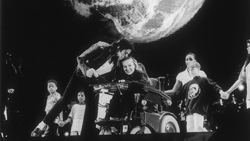Michael, Pop, and Race

A friend told me last night the sort of thing that you only admit when you’re standing in a bar where the entire room is grooving on the 18th song in a marathon of Michael: that recently, for no real reason, he had read through a bunch of the coverage of Michael right after Thriller was released. The general sentiment at the time, he told us, was awe at what Michael’s music did to existing standards of "black" and "white" music. Back then, Billboard had its top-10 mainstream chart, and a separate "Black LPs" chart, and there was little overlap between the two. Michael changed that.
I was less than born when Thriller came out in 1983, so for me, it was strange last night to think of Michael as he once was: someone who raised issues of race not by being some ever-changing hybrid of black and white, but by being black . I remember the occasional Jacko playground chatter, a child-like one-upping of knowledge: "Did you know Michael Jackson used to be black?" It was a sort of truth you came upon while looking through a cousin’s cassette collection or hearing tales from older kids, and wanted to spread, proud of your discovery, as you would your newly gleaned meaning of "second base." And you said it not fully understanding what those old images of Michael meant about his race now. Was he still black? What happened to him? But, in the manner of recess gossip, you rejected such ambiguities, and described to everyone how dark he was in that album you’d caught a glimpse of that weekend, and everyone ooohed and aaahed at the strange thought.
Despite Michael's drastically changing melanin levels within my lifetime, the racial reflections he raised in the early ’80s are a wonderful tribute to the work he did, and still feel relevant today. This is from a 1984 New York Times article by John Rockwell, headlined " In Pop Music, the Races Remain Far Apart ":
The vast majority of the populace sinks back in upon itself, lazily content with its own traditions and only vaguely aware of more vital, unfamiliar, challenging music just a few notches away on the dial. This applies to blacks as well, who may be missing out on exposure to challenging forms of white music they now don't hear often enough. Black and white music can overlap indistinguishably. But they have divergent stylistic tendencies, and those extremes can grow flaccid or eccentric when they aren't pollinated by the other-when audiences aren't regularly, unself-consciously exposed to styles other than their own.
Ultimately, the racial divisions in music may simply recede, as the listening public and the country as a whole grow more open-minded. If that happens, then maybe Mr. Jackson's success will turn out to have presaged something positive, after all.
Photograph of Jackson at a London concert in 1997 by Dave Hogan/Getty Images.
